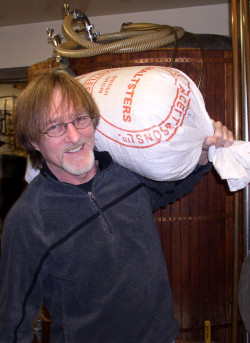The Class of ’88
Looking Back at a Quarter Century of Business, Beer and People
1994
Garrett Oliver went to work for Brooklyn Brewery.
1995
Bend Brewing became the second brewery to open in the central Oregon city of the same name. By then Deschutes Brewery was making more than 30,000 barrels per year and had begun construction on a four-acre site less than 10 minutes from its original downtown brewpub. Deschutes brewed 255,000 barrels in 2012 and sells its beer in 22 states. There are now 20 breweries in the immediate region of Bend, which has grown from 12,000 residents in 1988 to more than 80,000 today.
“Once upon a time we thought we could just stop (growing),” said founder Gary Fish. Pouring Deschutes beer at GABF in 1993, Fish told more than one drinker, “Sorry, but we don’t have any plans to sell our beer in Colorado.” Deschutes gave its beers names like Mirror Pond, Black Butte and Obsidian, “for local landmarks which someone in Dallas or St. Louis probably can’t relate to very well,” Fish said. “So we’ve had to change the way we communicate and make part of our brand proposition about discovering this beautiful place in Oregon.”
Things were different in 1988. “Then you just wanted to get people to try the beer,” said John Harris, who wrote the recipes for, then brewed Black Butte, Mirror Pond and other beers Deschutes still makes today. His voice became absolutely plaintive, making his point. “Please try it, just try it.” Harris was brewing at McMenamins Hillsdale Brewery & Public House in Portland and writing a plan to start his own brewery before Fish offered him a job. He returned to Portland in 1992 to work for Full Sail Brewing, quitting 20 years later to finally open his own brewery, Ecliptic Brewing.
When the final tally is in, Ecliptic will be one of 450 or more breweries to open in 2013. Again, things were different in 1988, but Harris sees similarities as well. “There is so much out there now, a lot of people say you have to do something weird and wacky to get attention,” he said. “I think you still want to make a consistent, tasty beverage.”
1996
Brewmaster Russell Schehrer, one of six original partners in Wynkoop Brewing, died on the eve of the Craft Brewers Conference (CBC) in Boston. Schehrer left active employment at Wynkoop in 1994 but remained a partner and consulted on multiple brewpub startups. He was living in Manhattan, advising Typhoon Brewery, when he suffered fatal injuries in a fall in his apartment.
1997
The Association of Brewers (now the Brewers Association) presented John Maier of Rogue Ales with the first Russell Schehrer Award for Innovation in Brewing. It has honored a brewer at each CBC since. Maier is one of seven of them who worked, or still work, at breweries that opened in 1988. “Some day someone will win this award who didn’t know Russ,” John Harris accurately predicted a few years after he received the award himself. But chances are the newest honoree will have been influenced by more than one of the earlier recipients and the breweries they work for.
Firestone Walker brewmaster Matt Brynildson, the 2007 recipient, has traveled the world since he took his first brewing job at Goose Island, serving as a spokesman for American beer culture as well as hops. “I’m probably one of very few of Goose Island’s production brewers who can make the claim that (brewmaster) Greg Hall ‘taught me how to brew.’ And that experience then is about as valuable as it comes,” he said. “We literally were teaching ourselves how to brew based on Siebel (the brewing school next door to Goose Island) textbooks. We all learned together and stuck to the roots of brewing and took that knowledge to our respective places where we sit now in the brewing industry.”
Harris, Steve Parkes (British Brewing Co. in Maryland) and obviously Greg Noonan also brewed the first batches for 1988 breweries. Maier, Oliver, Brynildson, and Dick Cantwell (Big Time Brewing in Seattle) later worked at them.
1998
The Oxford Brewing Co. brewed its last batch of beer, then sold the Oxford Class brand to Clipper City Brewing. Steve Parkes was brewing in his native England when he signed on as a partner in British Brewing. He put together the brewery equipment in England and had it shipped to the United States along with the ingredients to make beer for the next six months. “Nobody in America would sell us malt, sell us hops,” he said, a reminder of the challenges breweries faced in 1988. “Yeast was a nonstarter.” In fact, the first shipment of yeast arrived in personal luggage. “Even the littlest project could turn into a real kind of challenge,” Parkes said. He moved on to work for Humboldt Brews in California in 1992, and Oxford Brewing bought British Brewing shortly thereafter. Parkes later began teaching at American Brewers Guild, then eventually bought the guild. Although he worked as brewmaster at Otter Creek Brewing for eight years before opening his own brewery, Drop-In Brewing, in 2012, he said “my future is the school.”
1999
In his television series, comedian Drew Carey made Buzz Beer in his garage, but occasionally featured Great Lakes Brewing products from his Cleveland hometown. When an episode of the show, usually filmed in California, was shot in Cleveland, Great Lakes co-founder Pat Conway bid for and won a walk-on part.
Stan Hieronymus
Stan Hieronymus, a contributor to All About Beer Magazine for 20 years, is the author of several books on beer and brewing. The most recent, For the Love of Hops (Brewers Publications), deals with all aspects of one of beer’s essential ingredients.




looking to purchase class of 88 beers; can’t find them; living in northern new jersey.
Another fantastic, and fascinating, piece from Stan.